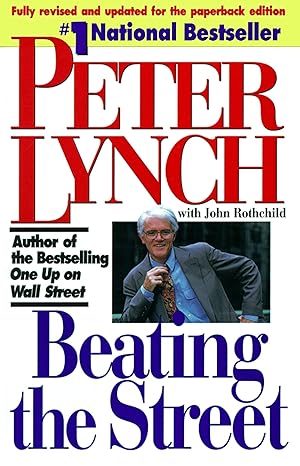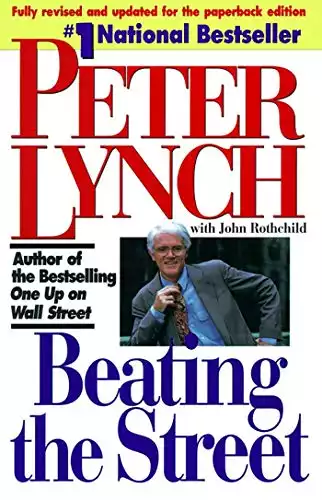Overview : Beating the Street by Peter Lynch
-
Book Title: Beating The Street
-
Author: Peter Lynch
-
Publication Date: January 1993
-
Rating: 4.5
-
price: $11.29
-
Pages: 336
About the Author
Beating the Street is authored by Peter Lynch, one of the most successful mutual fund managers of all time, known for his tenure at Fidelity's Magellan Fund. In this book, Lynch shares his investment strategies and insights on how individual investors can outperform the market.
Introduction to Beating The Street Book
Beating The Street Book Summary
Beating the Street by Peter Lynch tells readers how to approach stock investing with confidence and clarity. As one of the most successful mutual fund managers, Lynch shares his proven strategies for picking winning stocks and building a strong portfolio. The book provides practical advice, emphasizing the importance of researching companies, understanding their business models, and staying informed about market trends. Through real-world examples and personal anecdotes, Lynch simplifies complex investment concepts, making them accessible to investors of all levels. The book empowers readers to make informed decisions and achieve long-term financial success with a disciplined, hands-on approach to investing.
Analysis of Key Concepts
The "Invest in What You Know" Philosophy
One of Lynch's most famous principles is the idea of investing in companies and industries you understand. This concept encourages investors to leverage their personal knowledge and experiences when making investment decisions. For example, a tech-savvy individual might have an edge in identifying promising software companies, while a healthcare professional might spot emerging trends in medical technology.
The Power of Research and Due Diligence
Lynch stresses the importance of thorough research before making any investment. He provides a framework for analyzing companies, including examining financial statements, understanding business models, and evaluating competitive advantages. This approach aligns with modern investing practices, where access to information has become increasingly important in making informed decisions.
Long-Term Perspective in a Short-Term World
In an era of high-frequency trading and constant market noise, Lynch's emphasis on long-term investing is more relevant than ever. He cautions against trying to time the market and instead advocates for patience and conviction in one's investment choices. This philosophy is particularly pertinent in today's volatile markets, where short-term fluctuations can often distract from long-term value creation.
Writing Style and Accessibility
Lynch's writing style is a significant strength of "Beating the Street." He manages to explain complex financial concepts in a clear, engaging manner, often using humor and relatable anecdotes. This accessibility makes the book valuable for readers at all levels of financial literacy.
"Go for a business that any idiot can run - because sooner or later, any idiot probably is going to run it."
Quotes like this showcase Lynch's ability to distill complex ideas into memorable, actionable advice.
Strengths and Weaknesses of Beating The Street Book
Strengths:
- Timeless investment principles applicable across market cycles
- Clear explanations of complex financial concepts
- Practical advice backed by real-world examples
- Empowers individual investors to take control of their portfolios
Weaknesses:
- Some examples and case studies may feel dated
- Limited coverage of modern investment vehicles (e.g., ETFs, cryptocurrencies)
- May not fully address the impact of technology on today's markets
Beating The Street Related Books
While "Beating the Street" focuses on stock picking and fundamental analysis, it's worth comparing it to other influential investment books:
- "The Intelligent Investor" by Benjamin Graham: Offers a more conservative, value-oriented approach
- A Random Walk Down Wall Street" by Burton Malkiel: Advocates for passive investing strategies
- One Up On Wall Street" (also by Peter Lynch): Complements "Beating the Street" with additional insights
Each of these books provides a different perspective on investing, but Lynch's work stands out for its practical, actionable advice for individual investors.
Relevance in Today's Financial Landscape
Despite being written nearly three decades ago, many of Lynch's principles remain highly relevant in today's financial markets. His emphasis on understanding a company's business model and competitive advantages is crucial in evaluating both traditional stocks and modern investment opportunities like tech startups or cryptocurrency projects.
However, investors should complement Lynch's strategies with an understanding of current market trends, including:
- The rise of passive investing and index funds
- The impact of global economic policies on markets
- The growing importance of ESG (Environmental, Social, and Governance) factors
- The role of technology in shaping market dynamics
Highlights from Beating the Street by Peter Lynch
Invest in What You Know: Focus on industries and companies you understand to make informed investment decisions.
Do Your Research: Analyze a company’s fundamentals, such as earnings, growth potential, and market position.
Long-Term Perspective: Successful investing requires patience and holding onto quality stocks for the long term.
Ignore Market Noise: Don’t be swayed by short-term market fluctuations; focus on the company’s actual performance.
Stay Diversified: Spread your investments across different sectors to minimize risk.
Regular Review: Continuously monitor your investments and adjust your portfolio based on changes in company performance or market conditions.
Conclusion and Recommendation
"Beating the Street" remains an essential read for anyone serious about improving their investment skills. Peter Lynch's insights provide a solid foundation for understanding stock market dynamics and developing a personal investment strategy. While readers should supplement this book with more current resources on modern financial instruments and market trends, the core principles outlined by Lynch continue to offer immense value.
For those looking to take control of their financial future and build long-term wealth through investing, "Beating the Street" is an invaluable resource. It earns a solid 4.5 out of 5 stars for its timeless wisdom, practical advice, and ability to empower individual investors.
Ready to start your investment journey?
Purchase "Beating the Street" here and gain access to Peter Lynch's wealth of knowledge and experience in beating the market.
About the Author: Peter Lynch is a renowned investor and mutual fund manager. He headed Fidelity's Magellan Fund from 1977 to 1990, during which the fund's assets grew from $20 million to $14 billion. Lynch's investment philosophy and success have made him one of the most respected voices in the financial world. In conclusion, this article has provided an overview of the topic at hand.





